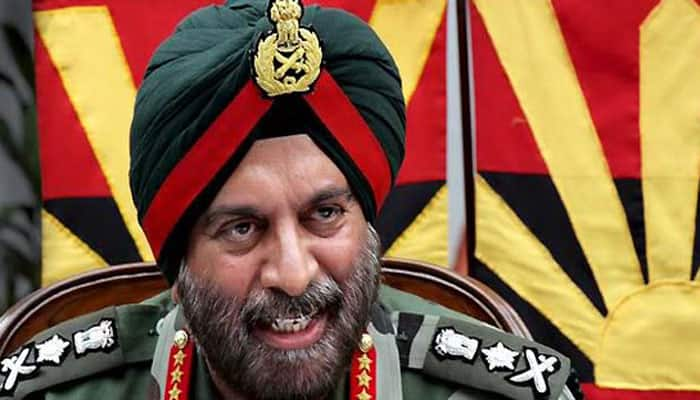The repeated ceasefire violations by Pakistan at the International Border in Jammu and Kashmir have become a matter of serious concern.
In the wake of escalating tension between the two countries, UN chief Ban ki-Moon has asked both India and Pakistan to resolve the issue through diplomatic channel and dialogue.
In an exclusive interview with Neha Attre of Zee Media, former Army chief and Arunachal Pradesh governor, JJ Singh, talked about several issues from Pakistan's attitude towards India to the Kashmir issue.
He has also written about the situation in Jammu and Kashmir and Sino-China border dispute in his autobiography 'A Soldier's General'.
He has served as the Indian Army Chief from February 1, 2005 to September 30, 2007.
Q) How should India view the repeated ceasefire violations by Pakistan at the border?
A. Pakistan must realize that aman and khushali are two sides of the same coin and that peace and prosperity are inseparable. The disastrous potential of inherent schisms and deep rooted contradictions within Pakistan have placed the people of Pakistan at the crossroads of history. They have to decide whether they want to be a moderate and progressive Islamic nation living in peace with their neighbors or let their destiny be decided by the Taliban, al Qaeda or other obscurantist elements like the ISIS. As I have written in my book 'A Soldier’s General', “The button for self-destruction might have already been pressed. Only the people of Pakistan could save their country by snapping the already-lit fuse cord before it reached the detonator, and arrest the downward slide into chaos and destruction.”
Q. Has there been any shift in the attitude and policy of Pakistan towards India since Narendra Modi took over as the Prime Minister?
A. Pakistan has been intrinsically and consistently antagonistic towards India over a host of issues. The prime factor is that it has not been able to reconcile itself to the fact that the state of Jammu and Kashmir acceded to India in October 1947. In Pakistan, democratic governments have never been given a real opportunity to run the country. As long as the Army and the ISI continue to call the shots from behind the curtain, there is little likelihood of a change in Pakistan’s ‘India policy’. Raking up the Kashmir issue from time to time is part of that strategy and there is nothing new in that.
Q. PM Nawaz Sharif raked up the Kashmir issue at the United Nations recently. What should have been India's stand on the matter?
A. Pakistan stands marginalized and is looked upon as a nation that harbours terrorists and abets terrorism. They have assiduously built up or encouraged certain terrorist networks such as Haqqani and Jaish-e-Mohammad to exist on their soil, and have designated them as strategic assets. At the same time, they have added to their own problems as the Frankenstein or extremist jihadi elements have come home to roost. India has presently taken a firm stand of ‘no talks under the shadow of terrorism’ and has shown an iron fist to effectively deal with provocative acts of violence along the LoC. An unambiguous message has gone to them that they will get it back in a befitting manner and it appears to be so on the ground.
Q) What should be India's stand towards its neighbouring country in the wake of current developments on the Kashmir issue and ceasefire violations at the border? A former CIA analyst, Bruce Riedel, has said that Pak ISI is undermining its own PM Nawaz Sharif and threatening India with 'terrorist brinkmanship'. Kindly elaborate on it.
A) India has a strong and mature leadership with an overwhelming mandate of the people. The strategy of ‘terrorist brinkmanship’ conceived by inimical forces in Pakistan will not work against today’s India. A calibrated and measured response by a responsible India taking along other world powers would be the answer to such challenges.
Q) Sanjay Baru's book 'The Accidental Prime Minister' stirred controversy after he claimed that while former PM Manmohan Singh was keen on peace initiative with Pakistan in Siachen after his visit in 2005, the effort was undermined by several prominent people including you who was serving as the Army Chief then. How would you react to it?
A) Over the years many attempts have been made to resolve the Kashmir and Siachen issues. Regular talks have been held by the two sides as a part of the composite dialogue (presently on a freeze mode). In the case of Siachen, our insistence on authentication of the actual ground position line (AGPL) by Pakistani and Indian forces before any talk of disengagement and redeployment of troops, has not been accepted by Pakistan and hence there has been no progress in this matter. This was the stand I took as the Army Chief in 2005 and the same was the case with the other chiefs too. National interest has always been uppermost in our minds including our political leadership.







